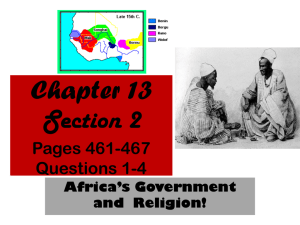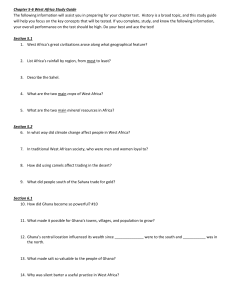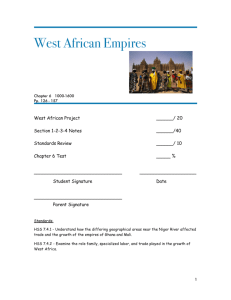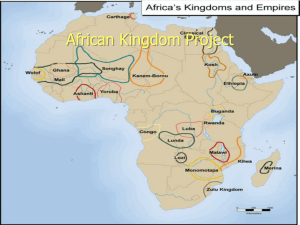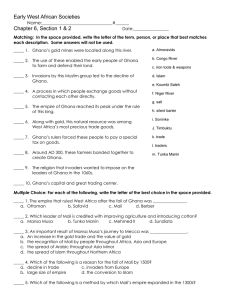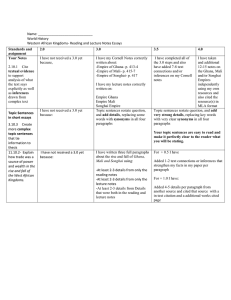fall of ghana rise of mali
advertisement
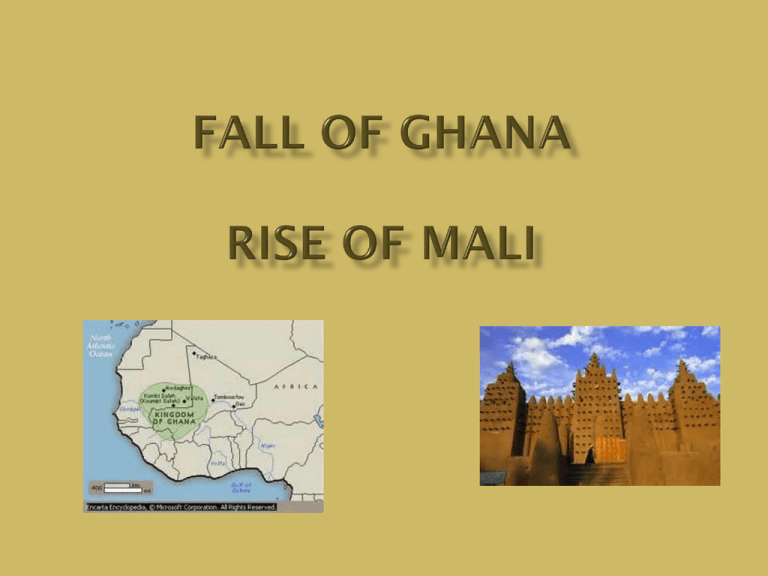
GHANA FALLS •Traders tired of paying high protection taxes found alternate caravan routes reducing Ghana’s wealth. •The government is having difficulty supporting and protecting the large population of people who have moved to their lands. This leads to lack of trade supplies and creates food shortages. SPIRAL CONTINUES •In 1060 the Almoravids, a group of Berbers try and attack Ghana from the NW. •They wanted to expand their Muslim faith, have control of the gold mines and utilize Ghana’s farmland to graze their animals. •The Almoravids FAIL, but it weakens Ghana and they NEVER regain their former wealth or strength. The empire of Ghana is NO MORE Power Struggles •After Ghana fell, the power of the land returned to the individual districts/kingdoms. There were constant battles for land and power. In 1203 Sumanguru took over what was left of the Ghana Empire. He was a cruel leader and killed those he felt threatened his power. In 1230 the neighboring Kingdom of Malinke led a rebellion to overthrow Sumanguru. ENTER THE KINGDOM OF MALI •The rebellion was lead by Sundiata. He took over in 1235, creating the Kingdom of Mali. These new lands included the former lands of Ghana and much more. Sundiata was nicknamed the Lion King. He was considered a great and wise leader. SUNDIATA’S ACCOMPLISHMENT’S • He called himself MANSA which means “emperor”. • Re-established Trade Routes with protection and took control of gold mines. • Increased kingdoms wealth by trading gold, salt, cloth, books and copper with Egypt and N. Africa. SUNDIATA’S ACCOMPLISHMENT’S CONTINUED Mansa Musa • Had army clear farmland to help people get back on their feet. Introduced the crop of cotton. • Continued attitude of religious freedom and tolerance although he was a practicing Muslim. • Ruled with an assembly of kings to establish laws such as who could own property, how individuals should act and how social classes would be determined. • Ruled for 25 years and was loved by his people. • Power was passed down through his bloodlines to his son Wali then his son Mansa Musa. •Ruled Empire of Mali from 1312-1337 •Continued practicing Islam like his grandfather and turned Mali into a center of Muslim learning and art •Opened a university for Islamic scholarship in Timbuktu •Left Mali for his once in a lifetime pilgrimage to Mecca in 1324 returning one year later. •His caravan had 12,000 officials and slaves in it and 80 camels loaded with gold dust and nuggets. Mansa Musa’s Continued •He stopped in Egypt during his hajj and it is rumored that he spent so much gold there he upset the economy for years. •His trip brought worldwide attention and travelers to the Kingdom of Mali. •By the 1400’s rulers of Mali began losing control of the empire. •In 1464 the Songhai Kingdom took over the lands of the Mali Empire including the city of Timbuktu •This empire was larger than the Empires of Ghana or Mali. •First leader of Songhai was Sunni Ali who was a great military leader •Arabic was used in the writing of the laws of the empire and spoken across the empire to create a common trade language and cementing the practice of Islam in North Africa. The last great leader Askia Muhammad had to step down due to health issues in 1529 leaving his sons to argue and compete against each other for control of land weakening the empire. In 1591 the country of Morocco invaded Songhai. Armed with guns they took control of the empire and the once thriving cities like Timbuktu fell in ruin. Tomb of Askia Muhammad

